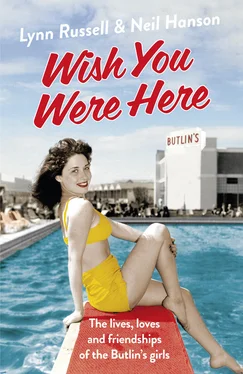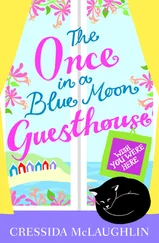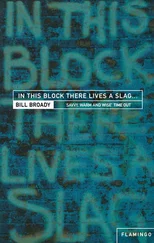Her dad was so strict that Hilary was still forced to wear little white ankle socks even when she’d left school, but she had a strong independent streak, so she used to go out on Tuesday nights wearing the ankle socks, telling her dad that she was going to the Guild of St Agnes at church, like a good Catholic girl, but then sneak off to the dance hall instead. She’d take off her ankle socks and put them in her bag, put on a bit of lipstick and then dance away with her friends until it was time to go home. However, her dad obviously suspected that she wasn’t quite as good a Catholic girl as she was pretending, because one night he followed her. As she was walking along she felt a hand on her shoulder, and there was her dad looking absolutely furious. ‘I want you back in the house, now,’ he said. ‘Get those socks back on your feet and wipe that dirt off your mouth.’ She was more embarrassed than frightened, but she knew that there was no use in arguing and that it was the end of her Tuesday-night excursions to the dance hall.
Her brother was five years older than her and almost as strict as her dad. He used to go to the same dance hall as Hilary and her friends and, she says, ‘He always kept his beady eye on me!’ She didn’t mind that – she quite liked the idea of her big brother being around. They were good pals, despite the age difference between them – and five years was a lot at that age. He didn’t snitch on her to her dad, but he would certainly let her know if he thought she wasn’t behaving like his little sister was supposed to. After her brother left school, he worked as a wool sorter and then did his National Service. She didn’t see him for almost two years because he was serving out in Cyprus during the troubles there, and she missed him a great deal.
Hilary went to a Catholic school in Bradford, but, looking back, she couldn’t say it was a very good education, and like the majority of her school year, she left at fifteen with no qualifications. Her first job was at J. L. Tankard’s carpet and rug factory in Bradford. She was employed in the finishing department, doing hand-sewing. It was all piecework and hard graft, but as young girls do, she and her workmates had a few laughs along the way.
One of her friends, Brenda, was a dab hand at doing hair and used to style theirs for them in the toilets at work. The girls would give her some of their ‘tickets’ – the slips of paper detailing the piecework jobs they’d done – so that she didn’t lose out financially from the time she was taking off work to cut their hair. ‘The Grecian styles were in then,’ Hilary says, ‘so we were all there at work with steel wavers and pin curls in our hair, singing along to the songs on the radio.’ After work they all used to go dancing together. Once she was paying her own way in the household, Hilary’s dad had to ease the restrictions on her, and from then on she and her mates were out every night of the week, either in the Sutton Dance Hall, the Somerset, the Queen’s or the Gaiety. ‘We used to go all over to dance,’ Hilary says.
Hilary and her workmates used to pay into a kitty to save for all sorts of things, including what they called the ‘Christmas Fuddle’. It took only a penny or twopence a week each, but when Christmas came around, that was enough to buy plenty of drinks, crisps and sausage rolls, and on the last day before the Christmas holidays they would stop work at lunchtime and wolf down the lot! Very few of them drank as a rule, but they certainly made up for that at the Christmas Fuddle. Deaf to parental warnings to ‘never mix your drinks’, they drank bottle after bottle of Babycham, Cherry B, Pony and Snowball – so much so that Hilary was pretty ill one year, and when she got home her parents weren’t impressed by the state she was in. The next morning, suffering her first hangover, Hilary wasn’t very impressed either.
As well as the kitty for the Fuddle, Hilary and the other girls were also saving for a holiday together, having made up their minds to go to Butlin’s at Skegness the following summer. They saved up all year, putting away whatever they could afford. Hilary used to put five shillings a week (25p) into a little tin towards her holiday, and saved half a crown (12½p) for clothes and shoes. She had to give her mum money for her board as well, and whatever was left after that she’d usually spend on going dancing.
There were fixed holiday times in all the industrial towns and cities then, when factories and mills would shut down for their annual clean-up and overhaul; an avalanche of, say, West Midlands car workers would descend on the holiday resorts one week, followed by Lancashire mill workers the next and Yorkshire miners the week after. In Lancashire mill towns the annual holidays were called ‘Wakes Weeks’, in other areas they were called ‘Feasts’ and in Bradford the holiday was known as ‘Bowling Tide’ – which was nothing to do with bowls, since Bowling was one of the Bradford districts and ‘tide’ was the local word for a holiday, as in Whitsuntide.
One woman from Bradford remembers her holidays as always being a bit of a home from home, because everyone from her street went on holiday to the same place at the same time. ‘You knew everyone when you got there, because it was all people from your street. I mean, you weren’t with any strangers, because even if you didn’t know them as such, you knew their faces.’ Since all the mills and factories in an area would shut down for the same week, tens of thousands of people were going on holiday at once, and they had to book far in advance – months or even a year ahead – because popular destinations like Butlin’s became full up very quickly.
In the 1940s and 1950s, when Butlin’s was at its peak, there were virtually no package holidays, and only the well-off could afford to travel abroad, so the holiday camps had a vast semi-captive market. The chalets may have been basic, but at a time when many young couples spent their first years of married life under the roof of one of their parents, a chalet at Butlin’s was often their first real taste of domestic privacy.
Very few families owned a car and the fact that everything you could want was in one place at Butlin’s was another powerful attraction. Once they got there, wives were freed from the toil and drudgery of factory work or housework – or both – for a whole week; few families could afford to stay for a fortnight. An article in Holiday Camp Review in 1939, ‘Holiday Camps and Why We Go There’, even claimed the camps were pioneering women’s rights. ‘At a camp alone a woman gains that pleasing sense of equality. The girl of eight, the maiden of eighteen, the grandma of eighty, rank with the boy, youth and grandpa without any sort of distinction. They are campers, first, last and all the time. Age and sex do not matter.’ It’s hard to think of any other British institution at the time where similar claims could be made with a straight face.
Unless they were in a self-catering chalet to save money (and they weren’t introduced until the 1960s anyway), there was no cooking, washing or cleaning for the women to do, and even childcare could be handed over to the nursery nurses or the redcoats in their signature red jackets, white shirts and bow ties, white trousers and white shoes. The children were marched off to sports tournaments, swimming galas and the Beaver Club (for small children) or the 913 Club (for nine- to thirteen-year-olds), or, if the weather was wet, to the endless array of rides, games, sports and competitions held in the ballroom and children’s theatre. So while their kids ran wild in safety, parents could swim or play sports if they felt energetic, or put their feet up and relax if they didn’t. They could sunbathe if the weather was fine, doze in an armchair if it wasn’t. They could play bingo or even booze the day away in the bar if they felt like it.
Читать дальше





![Питер Джеймс - Wish You Were Dead [story]](/books/430350/piter-dzhejms-wish-you-were-dead-story-thumb.webp)




![Brian Thompson - A Monkey Among Crocodiles - The Life, Loves and Lawsuits of Mrs Georgina Weldon – a disastrous Victorian [Text only]](/books/704922/brian-thompson-a-monkey-among-crocodiles-the-life-thumb.webp)

